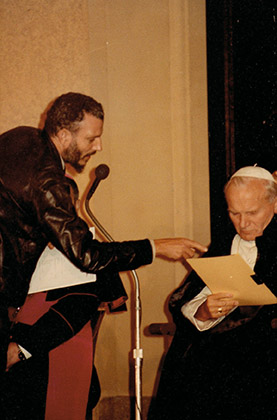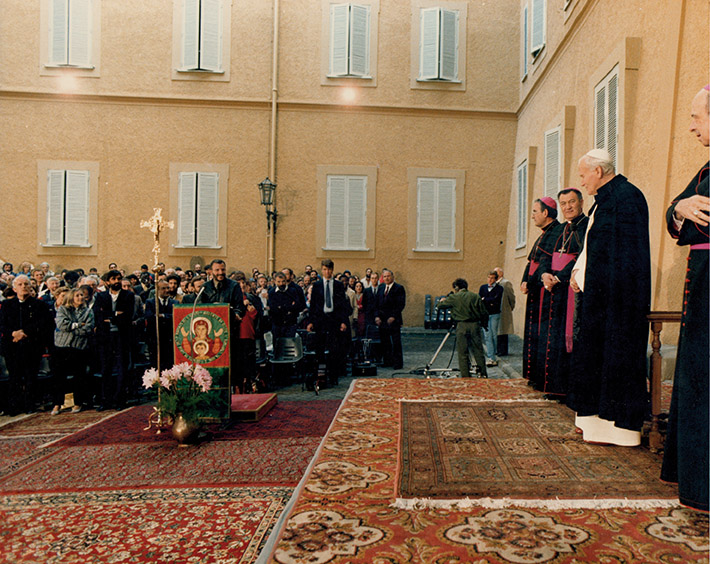Audience with the itinerants (Castel Gandolfo) September 26, 1984
St. John Paul II

Castel Gandolfo, September 26, 1984
The courtyard of the Pontifical Palace of Castel Gandolfo became a presbytery yesterday afternoon, during the Pope’s meeting with the Neocatechumenal movement. There was the chair, the crucifix hanging from the colored walls and frescoes, the lectern with the book of the Gospel, the cross, and an icon of the Virgin. And then carpets and flowers: gladioli of various colors which gave the place a sacredness interspersed with songs, prayers, and silence. Yesterday was the last appointment of the Holy Father before returning to the Vatican today and it was once again a meeting of prayer, of proclamation of the Word, of listening, of reflection, of propositions. Kiko Argüello, initiator of the Neocatechumenal Way, presented with quiet tones and sometimes fervently, the latest itinerant experience of all who were present at the meeting: “For two weeks, two by two, these ‘last ones’, these ‘little children of the Kingdom’ -he said addressing the Pope – they have gone to visit the nations of the world – possessing nothing but Christ Crucified – stopping to announce the ‘Good News’ to the poor, the marginalized, the priests of the parishes in the big cities as well as in the remote territories of Africa and Asia, to proclaim with faith that Jesus Christ is the Lord and the Redeemer of man.”
Kiko has communicated to the Pope this communal experience of the itinerant, similar to that of the apostles of the Gospel who after announcing the coming of the Kingdom, they returned home happy and experienced the strength of the presence of the Lord. In the various countries of Europe, North, Central and South America, Africa, Asia, and the Pacific (the initiator of the communities of the Neocatechumenal Way gave the Holy Father a very detailed picture of this itinerant experience of evangelization) these new messengers of the Good News have suffered and rejoiced in the cause of the Gospel.
A couple from Rome, a young seminarian from Barcelona, an Italian girl, a Polish girl, a Spaniard and a young Italian priest recounted, between the participation and emotion of those present, their ‘itinerant experience’. It was, in essence, a public confession of the wonders that God works through his ‘faithful’ who immerse themselves in the world to shake it from drowsiness and religious indifference.

From the great metropolis of New York to the favelas of Brazil, from the island of Cuba to China, from Italy to Scandinavia: these are the stages of an evangelical narration of our days, lived and testified to with the strength of love and faith. “They even took us for drug addicts”, said the young Polish woman when she told her own experience – “but later they understood that we had a Christian message to offer each one, with respect and with love.” The testimonial-story oftentimes went into some details that revealed the power of God which leads those who trust in Him with a sincere heart.
After the testimonies, the Pope spoke:
“In what you have been telling me, I have seen the authentic spirit of the disciples of Christ who give themselves totally to the Lord. You are itinerants, but it is Jesus himself who above all follows an itinerary within you, and then follows it within you towards others. The fact that you are itinerant is secondary; the main thing is that He is itinerant, that He wants to be itinerant. He wants not only to be present in the Church, but also to be itinerant in the Church, because the Church is itinerant, she is a Church walking on a way; it is not only an already affirmed, organized, structured Church, but a Church walking towards the people, towards communities, towards believers and non-believers; for Christ, these divisions have a different way of existing than for us.”
This truly evangelical trust characterizes your true itinerancy; carry nothing, do not have anything, not trusting in yourself, but instead, putting absolute trust in Providence, insofar as the Lord does in you. Another feature is humility: the Lord has saved me, He has rescued me from my sins and from my doubt and so I have lived a great grace, I have received strength from the Lord. I have personally experienced His strength and power, and now I must walk announcing this power, or better yet, transmitting this power to others. The Lord is powerful (the Pope raised his voice to pronounce this phrase)! And you trust in the power of the Lord and you want to experience this power in yourselves and also in others. The Lord is powerful in his death and resurrection, in his grace; He is powerful in the Holy Spirit.
Being bishop of Rome and Pope in this age of itinerants, I too have had to be an itinerant. There is a certain parallelism, a coincidence. But I must say that the itineraries that I carry out are much less austere. It is true, yes, that they ask a lot from us and that the program for a day is quite demanding; but we don’t walk on foot, we go with Alitalia or Air Canada, then with ‘Popemobile‘, so, I don’t know, I think that this way of being itinerant, you can’t accept it… So I ask myself and say: I can’t do more, in all humility I confess to you that I cannot do more. So let us continue to be itinerant, the Pope itinerant as he is, and you itinerant as you are. Now let us sing! … You must sing something: that which you sing everywhere and by which the neocatechumens are recognized: ‘Blessed are you who have believed…’